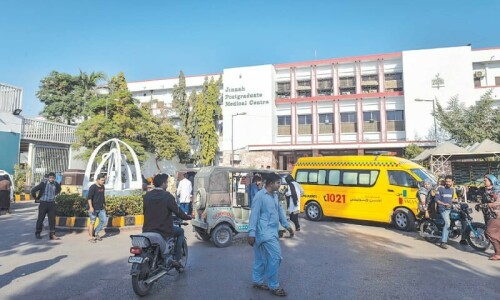KARACHI: In construction, ‘scaffolding’ is a temporary structure on the outside of a building made of wooden planks and metal poles on which the workmen can climb up for building, repairing, cleaning or painting. In teaching, according to Dr Martina Elizabeth Sharpe of Sydney University, this term is used widely to describe the specific help provided by the teacher that enables a student to achieve a specific goal that would not be possible without some kind of support.
And elaborating on how a teacher can support a student in his or her learning became Dr Sharpe’s keynote address at the start of the two-day 34th Society of Pakistan English Language Teachers (SPELT) International Conference 2018 at the Institute of Business Management here on Saturday.
“The teaching and learning cycle supports students through use of a shared metalanguage towards control of a particular genre or knowledge goal. Theories in Systematic-Functional Linguistics underpin the 4x4 framework with a sound pedagogical model. It empowers teachers to provide an explicit and systematic approach to their teaching,” she said. “By understanding the literacies of their own subject areas and developing knowledge and confidence in using a metalanguage to talk about the texts they value, classroom teachers are equipped to support their students to become competent readers and writers of their respective disciplines.”
With ‘Engaging the 21st Century Learner’ as the title of this year’s SPELT Conference, there were specially designed lectures and sessions, including webinars, workshops and paper presentations for the participating teachers that helped them reflect on the need to reconsider key issues in English language teaching with regard to fundamental changes taking place in the world.
Beth Trudell of BRAC University, Dhaka, Bangladesh, had a session looking at how radio can help solve the problem of few resources for English language learning in rural areas.
Dr Ron Thomson of Brock University, Canada, had a presentation about the importance of explicit English language pronunciation instruction.
The workshops included Lubna Panjwani’s ‘Unlocking your student’s hidden talent’, Abeer Hammadi and Marium Javed’s ‘Asking the right questions to enhance learning’ and Rana Hussain’s ‘Are English teachers ready to teach 21st century skills?’
A panel discussion on ‘Using technology for enhancing 21st century learners’ English language skills’ with Shumaila Omar, Syed Sajid Siraj, Irfan Sheikh and Dr Fauzia Shamim turned out to be an interesting discussion for teachers who are often at a loss when required to use technical skills to teach the modern learner.
The panellists opened up minds with their ideas and strategies such as using social media and other digital platforms to develop the speaking and writing skills of their students, something that is otherwise seen as a hindrance in classroom education.
‘The emerging mindset of the 21st century English language learner’ was another interesting panel discussion with Azru E. Daniel, Roofi Jamil, Dr Tayyaba Tamim and Roger Smith talking about the traditional methods of English language learning or teaching which have witnessed a paradigm shift in the 21st century. They explored new ways of learning English through the use of digital platform so that the emerging and changing mindset of the Pakistani English language learner could be understood and the teaching practice of Pakistani teachers is according to the current patterns of language acquisition.
The Urdu strand of the conference was an added treat. It also included a panel discussion on the same topic as was discussed by the English teachers about how to teach language to the modern learner of the 21st century with Dr Fatima Hasan, Dr Tanzeem-ul-Firdaus and Dr Rukhsana Sabah talking about taking new approaches to engage the students.
‘Urdu, Urdu teacher aur Bachon ke masail’ (Urdu, Urdu teacher and the issues faced by children) also turned out to be an interesting workshop by author Amra Alam looking at the reasons that scare children from taking an interest in the learning of the Urdu language.
Published in Dawn, November 4th, 2018













































Dear visitor, the comments section is undergoing an overhaul and will return soon.